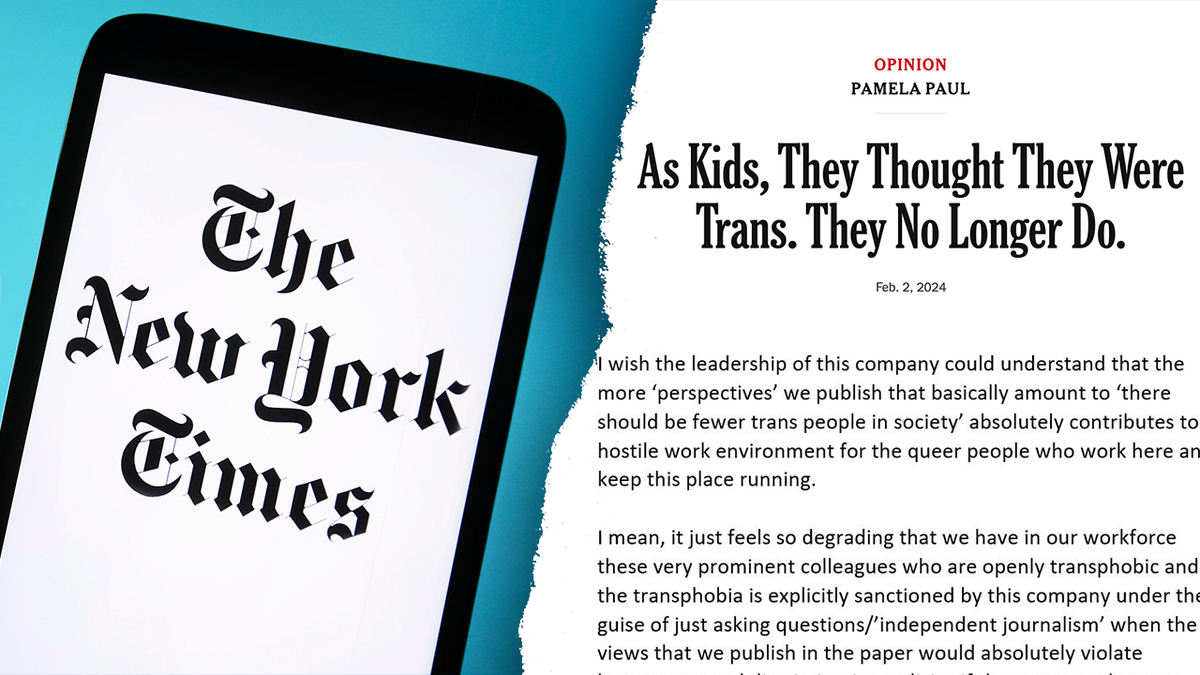The Times had a recklessly, irresponsible headline: Howard Kurtz
FOX News Howard Kurtz weighs in on the New York Times adding an editors note to its coverage of an explosion at the Al-Ahli Hospital in Gaza on The Story.
The New York Times has infighting with progressive staffers complaining about the paper’s coverage once again.
Washington Post media scribe Erik Wemple reported this week hat Times brass deleted internal communications from employees who criticized Pamela Paul's reported opinion piece headlined, "As Kids, They Thought They Were Trans. They No Longer Do."
The piece told the story of Grace Powell, a 23-year-old biological woman who is currently destransitioning from the sex change she began years ago. Paul told the Times that when she was 12 or 13 she "discovered she could be a boy," and at that time came to believe "that the reason she didn’t feel comfortable in her body was that she was in the wrong body. Transitioning seemed like the obvious solution."
According to Powell, she began hormone therapy during her senior year of high school, followed by a double mastectomy the summer before college, where she described herself coming across as "a very effeminate gay man." Looking back, however, the woman feels as though she should have asked more questions about her desire to transition before making the decision.

Media critic Erik Wemple reported that New York Times brass deleted internal communications from employees who criticized an opinion piece headlined, "As Kids, They Thought They Were Trans. They No Longer Do." (Photo Illustration by Pavlo Gonchar/SOPA Images/LightRocket via Getty Images/New York Times/Erik Wemple)
Powell suggested she was misled and went on to claim that right-wingers aren’t the only ones who have "inflamed this debate" over allowing kids to transition, but "transgender activists have pushed their own ideological extremism, especially by pressing for a treatment orthodoxy that has faced increased scrutiny in recent years."
Times staffers were annoyed, and Wemple posted a screenshot of the since-deleted Slack complaints on X.
"I wish the leadership of this company could understand that the more ‘perspectives’ we publish that basically amount to ‘there should be fewer trans people in society’ absolutely contributes to a hostile work environment for the queer people who work here and keep the place running," a Times staffer vented, according to Wemple.
"I mean, it just feels so degrading that we have in our workforce these very prominent colleagues who are openly transphobic and the transphobia is explicitly sanctioned by this company under the guise of just asking questions/’independent journalism’ when the views that we publish in the paper would absolutely violate harassment and discrimination policies if they were spoken out loud at another employee," the staffer continued. "This company’s commitment to diversity and inclusion is an absolute farce."
The internal criticism was harsh enough for management to act.
"We’ve removed Slack posts from a non-workflow channel that went against the company’s communications policy. We have multiple channels for our colleagues to discuss their thoughts on our journalism but we do not allow criticism of colleagues and their work in large forums," a Times spokesperson told Wemple.
The New York Times did not immediately respond to a request for additional comment.

The New York Times has infighting with far-left staffers complaining about the paper’s coverage once again. (REUTERS/Shannon Stapleton/File Photo)
Wemple added that "Times managers reportedly counseled the people whose posts were removed and attempted to steer them to channels where they can voice their concerns to editors or other company officials" and staffers "were given the opportunity to delete the posts themselves or edit them to comply with the policy."
Times current and former staffers criticizing the paper’s coverage is nothing new.
In December, former opinion editor James Bennet put a renewed spotlight on "illiberal bias" issues at the paper that were at the center of the media zeitgeist in 2020.
Bennet, who was forced to resign in 2020, penned a lengthy essay for The Economist outlining how liberal groupthink had taken over the Times newsroom. He suggested the paper has "lost its way," and said publisher A.G. Sulzberger forced him to resign with "icy anger that still puzzles and saddens me" because liberal staffers were offended by an op-ed he published by Sen. Tom Cotton, R-Ark., who suggested the military could be deployed to quell urban riots that summer.
Bennet called out his former employer, accusing the Times of graduating from liberal bias to illiberal bias and shutting down opposing viewpoints. He recalled top editor Dean Baquet asking in the midst of newsroom revolt over Cotton’s op-ed, "Are we truly so precious?"
"The answer, it turned out, was yes," Bennet wrote.
Bennet’s criticism of the Gray Lady echoed claims made by former New York Times opinion columnist and editor Bari Weiss in 2020, who published a scathing resignation letter saying she was bullied by colleagues in an "illiberal environment." Weiss noted that her own "forays into Wrongthink" made her the subject of "constant bullying by colleagues" who disagreed with her views.
LGBTQ NEW YORK TIMES STAFF FURIOUS AFTER HR EXEC TELLS THEM TO COMPLAIN ELSEWHERE: REPORT

Former Times opinion editor James Bennet, who was forced to resign in 2020, penned a lengthy essay for The Economist last year claiming liberal groupthink had taken over his old paper's newsroom. (Getty)
In April, LGBTQ Times staffers lashed out at the paper's Vice President of Inclusion, Natalia Villalobos, who irked employees when she encouraged them to stop complaining through the LGBTQ staff's online Slack channel, a Daily Beast report found. Several told Villalobos her suggestions threatened the safety of LGBTQ staffers, according to the report.
One complaint was then pinned to the top of the Slack channel in defiance.
"I can’t help but feel lately like I’m expected to just shut up and deal with the negativity because it might make some of my coworkers feel uncomfortable if I speak up," the staffer reportedly wrote.
The employee described the company's commitment to LGBTQ employees as lip service. "It feels completely surreal and disrespectful to get corporate swag branded with a pride flag at the same time as we’re being instructed not to publicly discuss our experiences as queer people in the workplace," the person wrote.
Prior to that, nearly 200 Times contributors wrote an open letter bashing their own outlet and claiming the paper was following the "far-right" in its coverage of transgender stories.
Also last year, New York Times military correspondent David Philipps ripped his employer for reporting the identity of a man behind a leak of U.S. military intelligence. On social media, Philipps accused the Times of having a double standard, stating it would’ve tried to protect the identity of the leaker if he had given his information to the paper, as opposed to "feverishly" tracking him down to reveal his identity.
There has also been infighting tied to coverage of the Israel-Hamas war.
The Intercept recently reported an episode of the Times' podcast "The Daily" about sexual violence committed by Hamas was shelved after "an intense internal debate" about the story. The Times told the publication it doesn’t "comment on the specifics of what may or may not publish in The New York Times or our audio program."
New York Times Magazine poetry editor Anne Boyer resigned in protest of what she calls Israel's "U.S-backed war against the people of Gaza" last year.
That came after Vanity Fair suggested that senior editors appeared to brush off concerns about coverage of the Gaza hospital bombing story from an international editor and a junior reporter stationed in Israel. At the time, Vanity Fair detailed hostile Slack messages in which employees bickered over coverage that was ultimately inaccurate and needed to be corrected with an editor’s note.
New York Times columnist Thomas L. Friedman then dinged his paper for its coverage of the story in a podcast appearance, saying a "newspaper we know very well" was among those that credulously spread the inaccurate Hamas framing that Israel caused the explosion.
CLICK HERE TO GET THE FOX NEWS APP
Fox News Digital’s Gabriel Hays, Kristine Parks, Nikolas Lanum and Joseph A. Wulfsohn contributed to this report.











































